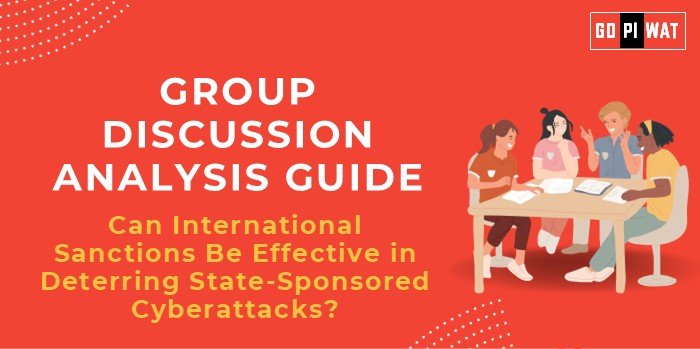📋 Group Discussion (GD) Analysis Guide
🌐 Can International Sanctions Be Effective in Deterring State-Sponsored Cyberattacks?
🌍 Introduction to the Topic
📖 Opening Context
In an era marked by heightened cyber dependency, state-sponsored cyberattacks pose a significant threat to global security and economic stability. Addressing this, international sanctions have emerged as a strategic tool to deter such cyber aggression, fostering accountability among state actors.
📜 Topic Background
Sanctions are punitive measures—economic, diplomatic, or military—designed to influence state behavior without resorting to war. In the context of cyberattacks, sanctions aim to hold sponsoring nations accountable, as seen in actions against countries accused of major cyber breaches, such as North Korea and Russia. However, their efficacy remains a topic of debate.
📊 Quick Facts and Key Statistics
- 💻 Global Cybercrime Cost: $8 trillion in 2023; projected to hit $10.5 trillion by 2025 (Cybersecurity Ventures).
- ⚖️ Sanctioned Entities: Over 200 individuals and companies linked to state-sponsored cyberattacks (UN Reports, 2023).
- 📈 Success Rate: Sanctions result in behavioral change in 34% of cases (Global Sanctions Database).
- 💰 Cybersecurity Investments: Governments allocated $190 billion in 2023 to mitigate state-sponsored attacks (Gartner, 2024).
🤝 Stakeholders and Their Roles
- 🏛️ Governments: Enforce sanctions and drive international agreements.
- 🌐 Private Sector: Collaborate in tracking illicit cyber activities.
- 🏢 International Organizations: UN, EU, and others provide frameworks and support for imposing sanctions.
- 📢 Civil Society: Advocate for ethical governance and monitor sanction impacts.
🏆 Achievements and Challenges
✨ Achievements
- ✅ Deterrence: Post-2014 sanctions, Russia’s overt cyber interference reduced in Europe.
- ⚙️ Policy Frameworks: Introduction of the EU Cyber Diplomacy Toolbox to counter cyberattacks.
- 🌟 Awareness: Global acknowledgment of cybercrime as a geopolitical weapon.
- 💡 Innovation: Increased investment in cybersecurity technologies and alliances (e.g., NATO’s CCDCOE).
⚠️ Challenges
- 🤔 Attribution Difficulty: Identifying state sponsors in cyber incidents remains elusive.
- 🔗 Limited Reach: Sanctions disproportionately affect civilians rather than leadership.
- 🛠️ Circumvention: Use of cryptocurrencies to bypass sanctions.
- 🌍 Global Divide: Disparate views among nations on the use of sanctions.
🌍 Global Comparisons
- 🌟 Success: U.S. sanctions on North Korea post-WannaCry attack reduced ransomware incidences.
- ❌ Challenges: Limited impact on China’s alleged cyber espionage due to economic interdependence.
📚 Case Studies
- 📖 NotPetya Attack (2017): Resulted in EU sanctions against Russia; notable decrease in high-profile attacks.
- 📉 Iran: Sanctioned following cyberattacks on U.S. banks, but covert operations persisted.
💡 Structured Arguments for Discussion
- ✅ Supporting Stance: “Sanctions are essential tools in curbing cyber aggression by increasing the economic and diplomatic costs for state sponsors.”
- 🛑 Opposing Stance: “Sanctions often fail due to attribution challenges and retaliation risks, which may escalate conflicts rather than resolve them.”
- ⚖️ Balanced Perspective: “While sanctions deter state-sponsored cyberattacks to some extent, their success depends on global cooperation and advanced attribution technologies.”
🎯 Effective Discussion Approaches
- 📊 Opening Approaches:
- Statistical Start: “Cybercrime is projected to cost the global economy $10.5 trillion by 2025. Can sanctions prevent this economic drain?”
- Case Study: “The 2017 NotPetya attack led to significant sanctions against Russia. How effective were these measures?”
- ⚡ Counter-Argument Handling:
- Highlight need for attribution improvements (e.g., AI for cyber forensics).
- Emphasize multilateralism to prevent sanction circumvention.
🧠 Strategic Analysis: SWOT
- 💪 Strengths: Deterrent potential, fosters international norms.
- 🛠️ Weaknesses: Attribution difficulties, retaliatory risks.
- 🌟 Opportunities: Collaboration via global coalitions like the G7.
- ⚠️ Threats: Cybercriminal adaptation and economic dependencies.
🏫 Connecting with B-School Applications
📚 Real-World Applications
- Relevant to projects on cybersecurity policy, global diplomacy, and risk mitigation strategies.
🎓 Sample Interview Questions
- ❓ “How can sanctions be made more effective in addressing cyber threats?”
- ❓ “What role do international coalitions play in deterring cybercrime?”
📘 Insights for Students
- 💡 Focus on technological solutions for sanctions enforcement.
- 📖 Explore legal frameworks underpinning sanctions.


